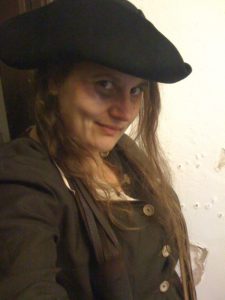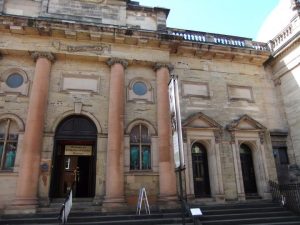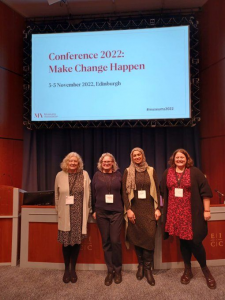July 5, 2023, by UoN School of English
How MA Applied English made me a better museum professional when I least expected it
I graduated with my BA in English Studies from UoN way back in 2004; 19 years later, in 2023, I’m just about to hand in the final piece of work of my MA in Applied English, studied via Distance Learning.
 In my tour guide costume at the National Justice Museum
In my tour guide costume at the National Justice Museum
 The Galleries of Justice, now named the National Justice Museum
The Galleries of Justice, now named the National Justice Museum
Between those dates is a long story, including some years in my 20s lost to an abusive relationship. A portfolio career that settled, half by chance, on museums: I’ve worked in museums and heritage sites for over a decade, starting as a costumed tour guide when I was nearly 30, eventually reaching senior management at 37. It was a rapid climb and I never had time to look at academic qualifications. When I eventually drew breath, I realised I worked in a sector where nearly everyone had a postgrad qualification. I wanted that.
But I didn’t want a Museum Studies MA. I find the heritage sector can be prone to navel-gazing discourse and feel strongly that new perspectives and inter-disciplinary work are what’s needed to energise it. Instead of seeking a museum qualification, I opted to return to my roots, my passion for English. I always loved that the UoN School of English Studies includes so many disciplines and approaches, so there was no other choice for me.
 Presenting at the Museums Association Conference 2022
Presenting at the Museums Association Conference 2022
And here is where the course took me by surprise. I have always been a Literature specialist, and loved Romanticism with a passion. Literature – to me – represents fragments, vignettes, of cultural history: I assumed that was where it would overlap with my professional life in heritage. Then, towards the end of my studies, I discovered a pod called ‘Performing Space and Place’. I’d never have chosen it in a less flexible course, but the pod structure of AE allowed me to give it a go. Suddenly, site-specific theatre, and the power of creating new spaces, counter-sites, to effect change, grabbed me. And it undeniably applied to museums too!
I’m just concluding a dissertation on site-specific, participatory performance in museums, and how the affective power of this can be harnessed to help museums have a social impact. My research is already informing my museum work, as I start to branch out into freelance work, and writing articles. I am considering a PhD application, focusing on interdisciplinary work between museum studies and theatre studies.
When I returned to the School of English Studies after nearly two decades, this isn’t what I expected. But it just goes to show where English can lead and how relevant it is to both professional work and other disciplines – and it demonstrates that where you start isn’t always where you end up, especially if you take the opportunity to explore your interests!
– Rebecca Morris-Buck
You can find more information on our MA Applied English by following this link.
No comments yet, fill out a comment to be the first

Leave a Reply